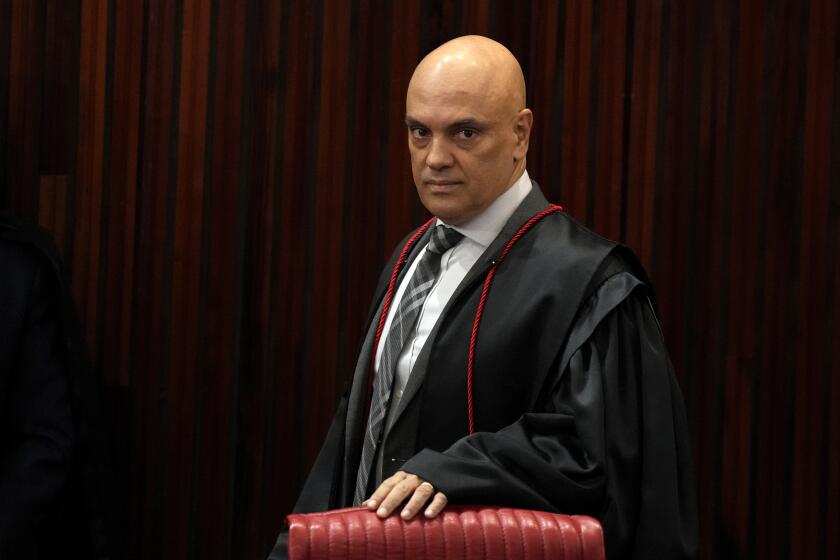Justices Swat Down Texans’ Effort to Weaken Species Protection Law
An effort by property rights advocates to attack the legal foundation of the Endangered Species Act was turned away by the U.S. Supreme Court on Monday, marking the end of a curious but closely watched case involving tiny cave bugs and a plot of undeveloped Texas scrubland.
The court let stand, without comment, a lower court’s ruling that the federal government has the authority under the Constitution’s commerce clause to protect rare animals even if they do not cross state borders.
The case, which focused on insects believed to exist nowhere else, was closely watched by environmental and property rights advocates. If successful, the case could have eliminated the protection of more than half of the 1,264 species covered by the Endangered Species Act, including such prized species as the Florida panther.
John Kostyack, senior counsel with the National Wildlife Federation in Washington, said the court’s decision should serve as a reminder that “the protection of endangered species is a national priority, not just a state-focused priority.”
“The most compelling reason is that all endangered species are part of a web of life,” he said. “If you start losing individual species, it has ramifications for many other species. We, as a country, have an interest in protecting these natural systems that we rely upon for our quality of life.”
More than 20 years ago, Texas developer Fred Purcell and several partners bought 216 acres of land in Four Points, Texas, for less than $3 million. The area, then a sparsely populated crossroads, soon became a bustling suburb of Austin. The land was recently appraised at $60 million.
Purcell and his partners have lost much of the land through foreclosure and have about 70 acres left. Despite a series of ambitious proposals, he has never been able to develop his property because scientists and environmental groups have found six species of unusual insects living underground there. The insects, some of which have been isolated for thousands of years, include a rare version of a daddy longlegs.
Purcell filed a $60-million lawsuit against the U.S. government in 1999, arguing that cave bugs could not be regulated through the commerce clause because they had no commercial value and did not cross state lines.
“I’m disappointed,” Purcell said. “I don’t know what happened.”
A separate lawsuit brought by Purcell against the government, arguing that decisions made about the insects represent an illegal “taking” of his land, will proceed, said Purcell’s Austin attorney, Paul Terrill.
Purcell’s case was financed by the American Land Foundation, a Texas group which fought restrictions on development and had compared conservation to socialism. The group spent $250,000 on the case. Its president, Dan Byfield, did not return phone calls seeking comment.
Purcell’s case has been celebrated by conservatives, who have long argued that Congress has abused the commerce clause to improperly inflate the role of the federal government. The Endangered Species Act, to some conservative activists, has come to embody oppressive government regulation.
The Supreme Court saw the broader legal debate in Purcell’s case too, and postponed its decision in recent months while it waited to rule on a more high-profile case involving the use of medical marijuana. To the untrained eye, the cases had little in common, but both turned on a debate over the role of the federal government and the use of the commerce clause to regulate a wide variety of activity.
Last week, a divided court ruled that federal drug laws trump laws in 10 states that had legalized marijuana for medical purposes. The decision in the Texas land case further erodes the hopes of many conservatives that Chief Justice William H. Rehnquist would lead a “federalism revolution” -- a campaign to limit the reach of Congress and the federal government.
“I had great hopes,” said John C. Eastman, director of the conservative Center for Constitutional Jurisprudence at the Claremont Institute in California. Eastman is also a law professor at Chapman University in Orange. “I think this demonstrates that Chief Justice Rehnquist’s legacy no longer includes any enforcement of the constitutional limits on the scope of federal power.”
Terrill, Purcell’s attorney, suggested that the Supreme Court had drawn too many parallels between the medical marijuana case and the land-use case.
“There is obviously an enormous market -- albeit illegal -- for marijuana,” he wrote in an e-mail from Italy, where he was on vacation. “[T]here has never been any commerce of any sort in cave insects. That alone should have distinguished the case.”
More to Read
Sign up for Essential California
The most important California stories and recommendations in your inbox every morning.
You may occasionally receive promotional content from the Los Angeles Times.










